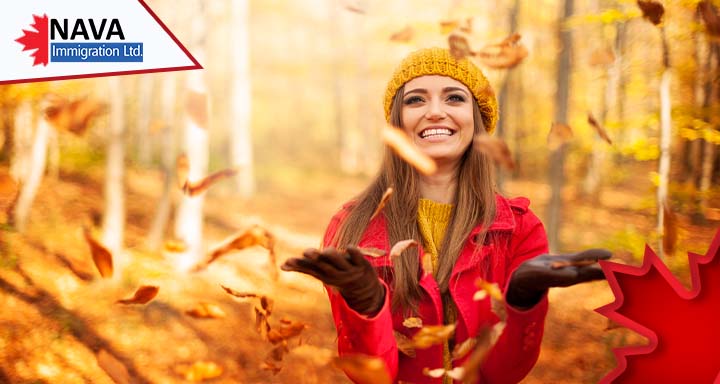What Every Newcomer Must Know Regarding First Fall In Canada?
Fall in Canada is characterized by cool temperatures, changing leaf colors, holidays, etc. If you are a newcomer, then this blog is for you. Here we will discuss what every newcomer must know regarding first fall in Canada. So, let us begin our discussion!
When Does Fall Begin In Canada?
While fall typically occurs from September to December, Canada has what’s widely regarded as the ‘first day of fall’. According to the National Research Council Canada, fall starts the moment when the sun is directly over the equator, going from North to South – the autumnal equinox.
In 2024, that first day of fall begins on September 22.
What To Expect During Fall In Canada?
Below is what every newcomer must know regarding first fall in Canada. Take a look!
- Shorter Days and An End To Daylight Savings
As the season progresses, expect days to get short and nights to get longer.
Fall also means the end of Daylight Saving Time. That’s the end of the eight-month-long period when a lot of Canadians set their clocks one hour ahead to make the most of daylight.
In 2024, Daylight Saving Time ends on Sunday, November 3, which can mean an extra hour of sleep on that specific night. However, this implies that the sun sets ‘earlier’ in the following days.
- Changing Weather
As the transition to winter begins, the weather can get drastically cooler. How cool it gets varies from province to province. For instance, British Columbia is known for milder and wetter weather, while in the Northwest Territories, temperatures can get frigid.
Moreover, in many parts of Canada, temperatures can change widely throughout the day, with colder mornings and evenings, while afternoons might still be relatively hot. Layering can help, and fall jackets are recommended.
Since this is a time of transition, expect the weather to sometimes be volatile. Snowfall as early as October is not uncommon across the nation. Some areas might also experience hurricanes, so keep an eye on the weather app.
Things To Do During Fall In Canada
What every newcomer must know regarding first fall in Canada? Take a look at the points below!
- Enjoy Fall Foliage
One of the best parts about fall is seeing the leaves change color.
There are many different places to experience the beauty of fall foliage, with hikes and treks in national parks being popular options.
Some famous places to witness fall colors in Canada include Algonquin Park in Ontario, Parc National du Mont-Tremblant in Montreal, and Stanley Park in Vancouver.
Some parks and provinces also have fall foliage trackers that share updates on the changing leaf colors to help you make the most of the season.
- Try Fun Fall Activities
With a nip in the air, fall is the perfect time to try fun outdoor activities. Apart from hikes and treks to see fall foliage, farms across the country have fun events for families and friends. Corn mazes, hayrides, apple picking, and pumpkin picking are some examples of must-do fall activities in Canada. Renting a cottage in a rural area to spend time with loved ones is also popular.
- Savour Fall Flavours
Autumn is the season for comforting food. Pumpkin and apple pies are popular at this time of year, and many coffee shops and bakeries offer limited-time pumpkin-sliced pastries and drinks.
Festivals That Take Place During Fall In Canada
Another thing that every newcomer must know regarding first fall in Canada is festivals. Below are the best festivals you can be a part of!
- Halloween
Halloween falls on October 31 every year, and is a widely celebrated and beloved holiday in Canada. In the weeks leading up to this day, except to find activities celebrating all things spooky – from scary movie marathons to jack-o-lantern carving competitions everywhere. Many people choose to decorate their homes and lawns with costumes, pumpkins, and other spooky Halloween decorations. On the day of Halloween, trick-or-treating is a popular activity where all children dress up in costumes and collect candy for their neighbors by going door to door. For adults, Halloween parties and haunted houses are great ways to embrace the day.
- Thanksgiving
Like the US, Canada also celebrates Thanksgiving—although there are some significant differences. To begin with, Canadian Thanksgiving takes place on the second Monday of October—almost a month and a half before the US holiday. It is a cozy time to gather with family and friends over good food. A meal with turkey, stuffing, and vegetables is traditional, although many have their own takes on the meal. This year, Thanksgiving will take place in Canada on October 14.
- Black Friday
Another popular US day that has gained popularity in Canada. Black Friday is traditionally held the first Friday after Thanksgiving in the US.
It marks the beginning of the holiday season, with retailers everywhere offering giant sales and discounts to make the holiday for loved ones easier. In Canada, it is held around the same time, although many retailers have sales and discounts starting a week or two beforehand.
- Cyber Monday
This is the first Monday after Black Friday, and it focuses on online sales and discounts so that everyone can enjoy deals from the comfort of their own homes. So, if you have any big purchases coming up—from electronics to household appliances to furniture—it might be worth waiting to see the latest deals.
If you seek information on how to begin your Canada immigration application process, you can talk to our NavaImmigration experts at 1800-918-8490, or you can drop us an email at [email protected].





